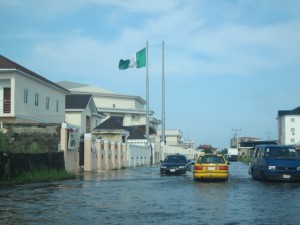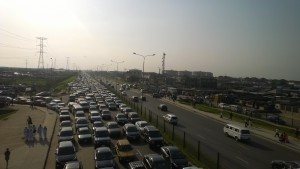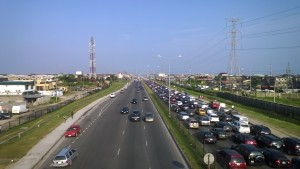On my way to work the other day, at the Oando Roundabout, one of the many along the Lekki-Epe expressway, I overheard a couple of traffic cops complaining about the drivers on the road. They spoke loud enough for drivers in each of the cars nearest to them on the road to hear, if they paid attention, as I did. They gesticulated as they spoke, complementing each other’s point within the same discussion. By the time I got close enough to them within the creeping traffic, all I could hear was “See them, all these cars, there is just one person in each of them!” I recognised it immediately as the same sentiment I’d harboured for a while, about the typical unwillingness of Lagosians to carpool. I also noticed that, like many of the drivers on the road that morning, I was also alone in my vehicle.
The Lekki-Epe expressway is a tar stretch of 49.5 kilometres starting somewhere around old Maroko (now called Sandfill) and ending, across the Lagos Lagoon at Epe. The road was constructed in the 80s during the last civilian administration before the military took over in 1983, but expanded recently when civilian rule returned to Nigeria in 1999 during the tenure of Bola Ahmed Tinubu. The expansion turned what was, at the time, a narrower town road into a wider stretch able to accommodate more vehicles commuting everyday to work at the Victoria Island end from deep into the Lekki peninsula. Lekki itself, like Manhattan in the United States is as much a peninsula as it is a mix-bag community of mostly middle and upperclass people (but with a considerable mix of lower class, indigenous people, itinerant service workers from out of state, and other ethnic Lagosians).

The House on the Rock Church, Lekki (pictured left, by the flag) was constructed with millions of dollars, and caters to the creme of Lekki middle and upper class Christians.
To claim to “live in Lekki” for most Lagosians and Nigerians is to claim a status that marks one as different from the masses. The image conjured is usually one of affluence: two to three cars for one family, a big house fully owned or at least rented at a high cost, a job in a prestigious bank or financial institution at the Marina or Victoria Island end of the Lagos island, and children who live either abroad, or who attend some of Nigeria’s most expensive schools. The perception is however unwarranted, of course, as many who live in Lekki (and yet work in low paying jobs, live in streets that get flooded whenever it rains, and typically take public transportation everyday to get to work) will attest. There are many “Lekkis”, from Lekki Phase 1, where the rich supposedly stay, and where rent for a three bedroom apartment start from two and a half million naira ($12,500) per year, to Jakande, halfway on the expressway, where rent is a little more affordable, but still higher for many average Nigerians (800,000/$3500) to Sangotedo, and beyond where many who can’t afford more than 400,000 naira per year ($2000), and lower, take residence. Like Manhattan, living on the Upper West Side is not the same as living in Harlem. Same borough. Different experience. (Certainly, different expenses).

On a typical evening, as in the morning for the other side of the road, hundreds of cars stretch as far as the eyes can see. (Photo taken at Jakande area)
What is true and indisputable about the peninsula today however was what was confirmed to me on that morning ride: there are too many cars on the road. In a recent news report, the number of private cars on Lagos roads was put at 600,000, with another 120,000 accounting for motorcycles. This is for a state of a population of about 9.013 million people. I don’t have a figure for the number of public transportation we have on the road, and we don’t know just how many of these vehicles ply the Lekki-Epe expressway, but what we see every day on the way to work, where a trip that should otherwise last for six minutes (Igbo Efon to Ikate, to use the example of my route) on a Sunday usually takes fifty minutes on a Monday morning, and the number of people we still see at bus stops every morning looking for rides to work way past the 8am opening hours, tell us that there is not an efficient ratio between the number of cars available and the people who need or use them. The is so much wealth, but little value.

Another view of the road at around 4pm in the afternoon. Motorists, most of them private cars, carrying less than two people in many cases, file behind each other for stretches of kilometres.
The Ibeju-Lekki local government that covers most of the area accessible to this expressway has a population of 117,481, out of which one can guess that more than a quarter of the adult residents have private means of transportation sometimes for themselves and for their spouses (and in some cases another one to pick up and drop off their children in school). This, ordinarily, shouldn’t be a problem in a free market, capitalist, democracy. The problem comes from what this has meant for city planning, the climate, sustainable development, ease of access for commuters, the road itself, and wellbeing in general.
Living in big cities has likely always had its drawbacks much of which relate to the level of noise and environmental pollution. In the case of Lagos however, much of it seem preventable and at the same time sadly inevitable. By having too many cars on the road most of which have the passenger seats empty, traffic jams increase, preventing most people from getting to work on time (except they have to wake up as early as 3.30am, like many of my colleagues do, thus reducing their quality of life, and costing companies millions of naira every year in wasted work hours otherwise spent in traffic, morning or evening), we pay a price in more ways than one. The traffic jams affect everyone including those in private transportation. A road that can currently take four to five cars at its widest, wear and tear increases as well as other maintenance expenses accruing to the state due to use, and may even break down into disrepair. More than that, more cars equal more carbon emission, damaging the atmosphere and endangering inhabitants, many of whom are already unhealthy from a sedentary lifestyle encouraged by private cars.
There are many solutions to the problem, but the state government will need to step up. For one, the Lekki-Epe Expressway, by now, should have ceased being the only access road across the Lekki peninsula. A beach-side road from Victoria Island, said to have been under construction for a number of years, needs to be completed as soon as possible. So are the number of inside connections that can take a commuter from Lekki Phase 1 to Ajah without having to get on the expressway. These routes haven’t been developed because the government hasn’t invested enough in making the constructions needed to connect these barely motorable inside roads. And, away from cars, where are the safe bicycle routes that commuters can use, satisfying one’s exercise and transportation needs at the same time? New York has more people, and more cars, yet there are spaces for cyclists to ride. Where are the large commercial ferries subsidised, perhaps, by the government, to move large quantities of people from Epe to Victoria Island without fuss? Where are the trams and in-city trains? Also, what about policies that encourage carpooling where, for instance, cars with at least three people inside it will get a free or reduced pass through the toll gate, or at worst expedited passage?
From my experience as a commuter without a private means of transportation, I can attest to the goodness of a number of Lagos residents many of who will stop to give strangers a free (or even reduced cost) ride towards their destination early in the morning or in the evening. I have given many such free rides myself, particularly when it rains. However, this is not, and should not be enough. There have been other solutions, including the new ride-share services like JeKaLo and GoMyWay which are both Nigerian solutions to allow the private owner to carpool with vetted strangers for a small fee. I haven’t used either of them so I can’t speak to their safety or otherwise, but their continuing success through use points to the fact that they are meeting a need and solving some of the problem. Services like Uber, Lyft, etc are also playing a part in reducing the number of private cars on the road by allowing their owners use them for public transportation during their free hours.
We need many more ways of solving a problem that seems – with the number of newly imported cars entering the city every month – to be on the way to only get worse. As for me, I’d keep taking occasional opportunities to trek and explore the outdoors, saving car fuel in the process and stretching my legs. I’d say let’s look away from cars totally, but this is Lagos, the city of statuses and egos. That would take a very long time.
_________
All photos courtesy of the blogger
No Comments to The Emptying Vessels of Lagos so far. (RSS Feeds for comments in this post)
No one has commented so far, be the first one to comment!